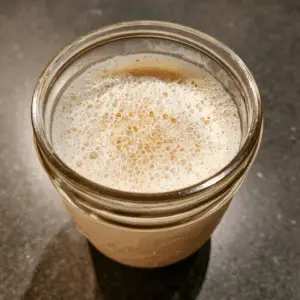
Fermented Vegan Kefir with Coconut and Flax
Equipment
- Glass jar (quart-sized) Non-reactive and fermentation-safe. Avoid metal containers.
- Plastic or wooden spoon Metal can harm the kefir grains over time.
- Cheesecloth or breathable lid To cover the jar and allow air flow while keeping bugs and dust out.
- Rubber band To secure the cheesecloth in place.
- Fine mesh plastic strainer For separating the kefir grains post-fermentation.
- Blender or whisk To blend in the flax and any optional flavorings.
Ingredients
Core Ingredients
- Coconut milk 2 cups – Use full-fat canned coconut milk for the best creamy texture. Avoid sweetened versions.
- Water kefir grains 3 tablespoons – These are key to fermenting the beverage. You can purchase them online or from fermentation specialty shops.
- Ground flaxseed 2 tablespoons – Adds omega-3s, fiber, and a subtle nutty taste.
- Filtered water 1 cup – Needed to create the right consistency and support fermentation.
- Maple syrup or coconut sugar 1 tablespoon – A fermentable sugar to feed the kefir grains. This gets mostly consumed during fermentation.
- Vanilla extract 1 teaspoon – Optional, but adds a soft aromatic quality.
- Sea salt a pinch – Helps balance flavors.
Optional Add-ins
- Cinnamon or cardamom ¼ teaspoon – For added warmth and complexity.
- Chia seeds 1 tablespoon – For extra fiber and texture.
- Lemon zest or grated ginger ½ teaspoon – For brightness and digestion support.
Instructions
Step 1: Activate Your Water Kefir Grains
- If your grains are dehydrated, activate them by soaking in sugar water (¼ cup sugar in 4 cups of water) for 3–4 days at room temperature, changing the water daily. Once they become plump and slightly translucent, they’re ready for use.
Step 2: Prepare the Base
- In a clean quart-sized glass jar, combine the coconut milk, filtered water, ground flaxseed, maple syrup (or coconut sugar), vanilla extract, and sea salt. Stir thoroughly with a plastic or wooden spoon to evenly distribute the flax and sweetener.
Step 3: Add the Kefir Grains
- Gently stir in your activated water kefir grains. Don’t use metal utensils or bowls when handling them—this can weaken or kill them over time.
Step 4: Cover and Ferment
- Cover the jar with cheesecloth and secure it with a rubber band. Set it in a warm, dark place (between 68°F and 78°F) for 24 to 48 hours. You’ll start noticing small bubbles and a slightly tangy aroma—both are good signs of fermentation.
Step 5: Taste and Check for Fermentation
- After 24 hours, give it a taste. If it still tastes overly sweet, let it ferment for another 12–24 hours. Wondering when is water kefir done fermenting? It’s ready when the drink is mildly tangy, slightly effervescent, and most of the sweetness is gone.
Step 6: Strain and Store
- Using a fine mesh plastic strainer, remove the kefir grains and store them in sugar water in the fridge for your next batch. Pour the fermented beverage into a clean jar or bottle and refrigerate. Shake well before serving.
Step 7: Optional Second Ferment
- Want more fizz or deeper flavor? Add a few blueberries or a strip of lemon peel, seal the jar, and let it sit at room temperature for another 12–24 hours before refrigerating.